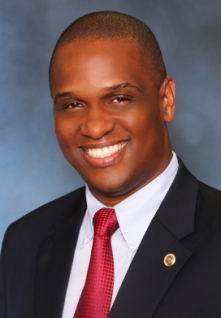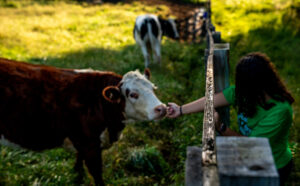How do we strengthen the connection between family and youth development? It’s with various in-school and after-school programs that 4-H is able to not only contribute to the upbringing of today’s youth, but to encourage greater family engagement. The work of 4-H is beneficial to all involved—youth, parent/guardian and adult leader/mentor.
So, what organization knows the importance of youth and family engagement better than the National Parent Teacher Association (PTA). In celebration of National PTA Founders’ Day, we were honored to chat with the National PTA president and 4-H alumnus Otha Thornton.

“[Serving people] was the core of 4-H to me,” he says, recalling the third H—pledging his hands to greater service.
During his five-year involvement with 4-H, Thornton participated in a number of programs, including gardening, photography and canning, with his photography skill earning him an award for what was a personal hobby of his.
Thornton went on to receive his bachelor’s degree in urban planning from Morehouse College and received his master’s degree in communications from Michigan Technology University. He also served in the United States Military and is now a retired United States Army Lieutenant Colonel. Aside from his role as National PTA president, Thornton currently works as an operations specialist at General Dynamics.
We caught up with Otha Thornton to get his insights on today’s 4-H and how he feels its values are helping to empower youth in varied communities across the country.
How do you think 4-H is helping develop youth today?
Otha Thornton (OT): I believe 4-H is developing youth now through the importance of service in the community, through the importance of being healthy adults and also developing leadership skills. Youth are given so many opportunities to develop their leadership skills through 4-H.
Tell us about other interests you gained because of skills developed in 4-H?
OT: When you’re in 4-H, you’re exposed to so many different things and exposed to different people. That, for me, was very important. I also think about the four H’s: Managing and thinking (Head); Relating and caring for people (Heart); Giving and working (Hands); Living a healthy lifestyle (Health). Those values help. They really make a difference.
Today, 4-H is focused and committed to serving youth in all backgrounds, including those in urban communities. What challenges do you see these youth facing today and how do you think 4-H can play a part in solving these issues?
OT: I think what is critical is empowering our youth to reach their full potential. It’s important to partner with communities and continue to give kids opportunities, especially in the urban communities. I know 4-H is strong in our rural communities, but it’s also in the urban communities where 4-H can really make a difference.
With your military background, how do you think military families and youth benefit from the 4-H Military Partnerships?
OT: I believe 4-H work with children in military families benefits them by reinforcing positive physical and mental development. One thing I know 4-H offers is mentoring programs. These are the sort of programs that work really well for the military and its partnership with organizations like 4-H. Mentoring is really important in the positive development of military youth.
What does it take for families to become actively involved in a child’s learning and upbringing, both during and after school?
OT: One of the things PTA is working on, which is an element of what 4-H is doing, is promoting the importance of health and healthy lifestyles. PTA has great programs that promote healthy lifestyles as far as education. We’re working very closely with communities across the country to help put an emphasis on early childhood education. Encouraging healthy lifestyles is what will make our kids more productive and more competitive in the country and the world.
What is top priority for National PTA right now?
OT: PTA is now leading in family engagement. We’re working with the secretary of education, we’re working with Congress, and we’re working with folks all around the country to find ways to get more families involved in education. They estimate that when you invest in a kid in education, that’s almost equivalent to $1,000. We want to get all family members in every family engaged. The bottom line is when you get involved, kids do better in school and it opens up more opportunities for them and their lives.
Do you think the importance of family engagement is prevalent in the work of 4-H?
OT: Absolutely! The mission of 4-H is to empower youth to reach their full potential through working and learning with the help of partnerships with caring adults. That contributes to family engagement.
How do you think 4-H is helping to build towards its vision of growing more youth leaders and preparing them for leadership roles as an adult?
OT: I believe what’s most important is the values 4-H encourages. It teaches kids how to manage and how to think. The organization also stresses the importance of being able to relate and genuinely care for people and make a difference. Giving back to the community and working to make them better is also a crucial value. Lastly, 4-H is teaching youth about being healthy and living the healthy lifestyle that will make a difference in their lives and being better, more productive citizens. These are very important values that 4-H provides to strengthen the leadership skills of youth.
















